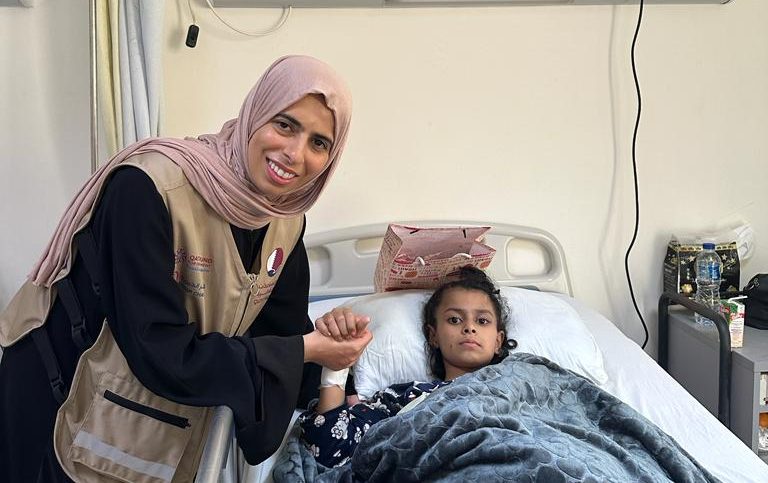Doha managed to extend an initial four-day truce for two days on Monday, just hours ahead of its expiration.
Qatar’s Minister of State for International Cooperation at the Ministry of Foreign Affairs, Lolwah Al Khater, visited Palestinians wounded by the Israeli aggression on Gaza at the Al Arish General Hospital in Egypt’s Sinai on Monday.
“During her tour of the wounded, Her Excellency expressed the State of Qatar’s complete solidarity with them and its wishes for a speedy recovery, as well as its readiness to provide medicines, equipment, and medical supplies to all the wounded Palestinian brothers and sisters both inside and outside the Gaza Strip,” Qatar’s foreign ministry said in a statement.
The top Qatari official was accompanied by Egypt’s Minister of Health, Khalid Abdul Ghaffar, as well as Palestine’s Minister of Health, Dr. Mai Al Kailah.
At least 135 wounded Palestinians, 60% of which are children, are currently receiving treatment in Egypt, per figures shared by Egyptian media on Sunday. And 28 incubator babies were also transferred to Egypt on November 20 through Rafah following the Israeli raid of the Al-Shifa Hospital in Gaza.
During her tour, Al Khater renewed Qatar’s calls for the permanent opening of the Rafah crossing “to ensure the continued flow of Qatari humanitarian aid” to Palestinians in Gaza. Qatar sent a total of 26 aid flights to Gaza since the start of the war on October 7, the foreign ministry statement added.
Al Khater’s visit to the hospital in Al Arish came a day after she visited Gaza as the first high-ranking Arab official to enter the besieged Palestinian enclave since the start of the Israeli aggression.
In a statement on Sunday, Qatar’s foreign ministry said the delegation aimed to oversee the delivery of Qatari aid to Gaza’s 2.2 million people.
Speaking to Al Jazeera Arabic from Gaza on Sunday, Al Khater explained that the aid delivery has faced “logistical difficulties.”
“Qatar is ready to provide a greater amount of aid, but due to logistical obstacles and limits set on the amount of aid allowed to enter each day, there is no point in sending quantities of aid that will be left to pile up – especially if it is medical aid,” she said on the channel’s live broadcast.
The Qatari diplomat’s visit came on the third day of an initial four-day truce mediated by Qatar which entailed the entry of additional aid into Gaza, including fuel. The deal saw the release of 69 captives from Hamas in Gaza in exchange for the release of 150 women and children from Israeli prisons.
Qatar’s Foreign Ministry spokesperson Majed Al Ansari later announced the extension for two additional days during its final hours on Monday night following an agreement between Doha, Cairo and Washington.
Al Ansari added that Qatar is working towards reaching a permanent ceasefire in Gaza.
The Israeli occupation forces (IOF) have killed at least 20,031 Palestinians, including 8,176 children, since the start of the genocide on Gaza, according to figures by Euro-Med.
A total of 36,390 others have been wounded by the bombardment, with Gaza’s collapsed health sector grappling with a severe shortage of medical supplies and basic resources amid the complete Israeli siege on the Strip.
Israel targeted 124 medical facilities, including 22 hospitals and 55 clinics, according to Euro-Med.
The figures by the NGO are being widely cited as Gaza’s collapsed health sector stopped keeping track of the total toll after the ground invasion of Al-Shifa Hospital on November 18.
The Al-Shifa Hospital, the largest medical facility in Gaza, was subjected to an invasion by the ground offensive in northern Gaza on November 14, where hundreds of patients were receiving urgent treatment and displaced Palestinians were taking shelter.
Israel had ordered the evacuation of the hospital on November 18 over allegations that it had tunnels sheltering Hamas fighters. Those allegations have been debunked by numerous investigations, including by Human Rights Watch (HRW).
Some patients were unable to exit the hospital and Israel took into custody its director, Muhammad Abu Salmiya, whose whereabouts remain unknown. Salmiya had been vocal about the conditions of the hospital as well as Israeli attacks on the facility.
Al-Shifa has been described by global organisations, including the World Health Organization (WHO) as a “death zone.”







